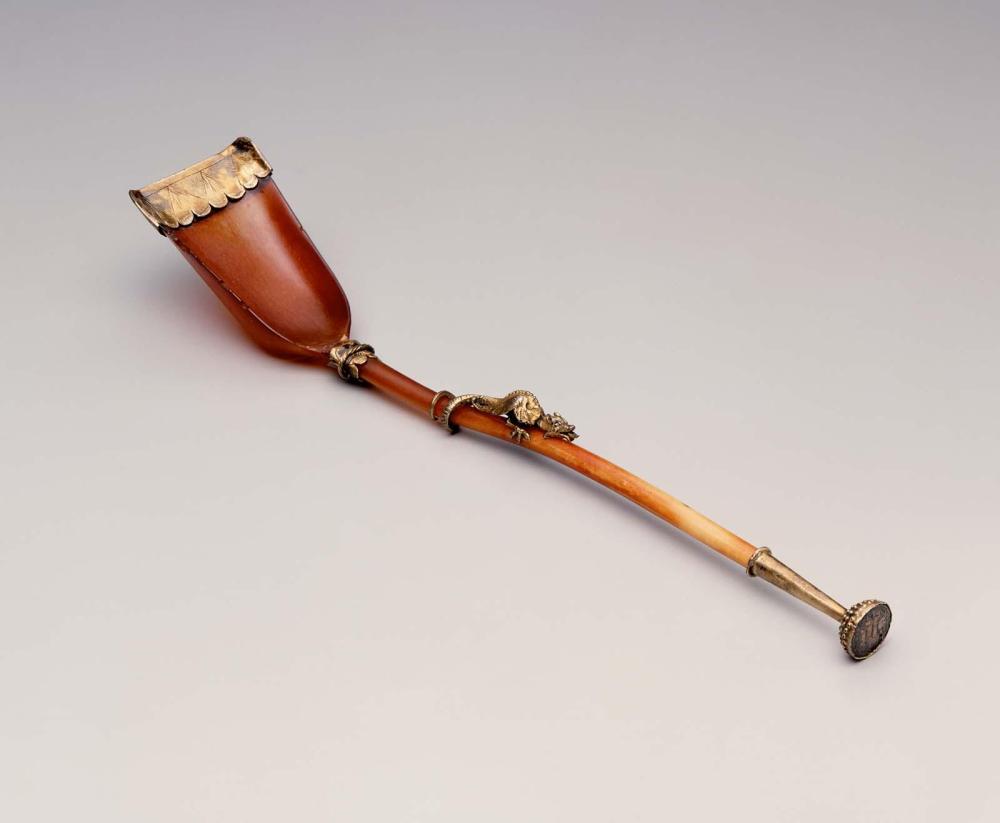Advanced Search 
Eucharistic spoon

Spoon
Eucharistic spoon
German (?)
15th century (?)
Object Place: Europe, England
Medium/Technique
Tinted horn and silver (92.2% silver, 7.8% copper) with gilding and niello
Dimensions
3.5 x 21.2 cm (1 3/8 x 8 3/8 in.)
Credit Line
Theodora Wilbour Fund in memory of Charlotte Beebe Wilbour
Accession Number65.102
CollectionsEurope
ClassificationsMetalwork
DescriptionSpoon with slightly curved rod handle and bowl in the shape of a shovel; gilded silver mounts. Spoon carved in one piece; mounts cast or hammered, chased, repoussé, and gilded. With his feet clutching the handle and his tail wrapped around it, a dragon appears to crawl toward a seal-top finial with IHS engraved in Gothic letters surrounded by niello on the top and with four rows of repoussé dots on the outside. The dragon, whose body is cast in one piece, has an open mouth, extended tongue, beaded band on his back, and applied wings chased with shallow lines and zigzag bands. The roughly engraved mounts on the edge of the bowl and at the base of the handle have scalloped edges and a chevron pattern of alternating cross-hatched triangles and hear-shaped segments. Irregular lines emanate from the point of the heart-shaped segments whose curved edges are decorated with zigzag lines.
Provenance1938, Baron Maximilian von Goldschmidt-Rothschild (b. 1843 - d. 1940), Frankfurt; November 11, 1938, forcibly sold to the city of Frankfurt, probably for the Museum für Kunsthandwerk; February 26, 1949, restituted by the city of Frankfurt to the estate of Maximilian von Goldschmidt-Rothschild; 1949, consigned by the Goldschmidt-Rothschild estate to Rosenberg and Stiebel, New York; April 13-14, 1950, Goldschmidt-Rothschild estate sale (consigned by Rosenberg and Stiebel), Parke-Bernet, New York, lot 64. Ernest Brummer (b. 1891 - d. 1964), Brummer Gallery, New York; to his widow, Ella Brummer (b. 1900 - d. 1999), New York; 1965, sold by Ella Brummer to the MFA. (Accession Date: February 10, 1965)
NOTE:
[1] In November 1938 Nazi authorities forced Maximilian von Goldschmidt-Rothschild to sell his art collection to the city of Frankfurt. Upon his death in 1940, the objects were transferred to and accessioned by various city museums. After the war, his heirs succeeded in legally voiding the 1938 sale and recovering the collection, which was sent to the United States. See Matthias Wagner K and Katharina Weiler, eds., "The Collection of Maximilian von Goldschmidt-Rothschild" (exh. cat., Museum Angewandte Kunst, Frankfurt, 2023), pp. 107-154.
NOTE:
[1] In November 1938 Nazi authorities forced Maximilian von Goldschmidt-Rothschild to sell his art collection to the city of Frankfurt. Upon his death in 1940, the objects were transferred to and accessioned by various city museums. After the war, his heirs succeeded in legally voiding the 1938 sale and recovering the collection, which was sent to the United States. See Matthias Wagner K and Katharina Weiler, eds., "The Collection of Maximilian von Goldschmidt-Rothschild" (exh. cat., Museum Angewandte Kunst, Frankfurt, 2023), pp. 107-154.
